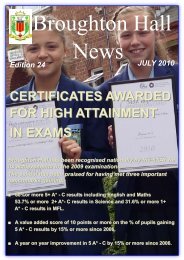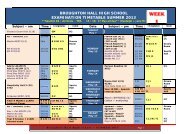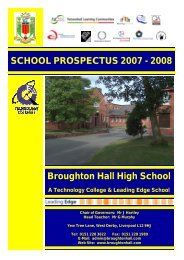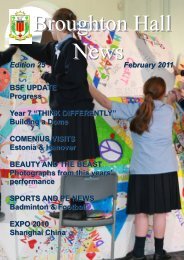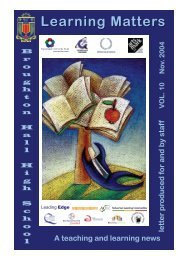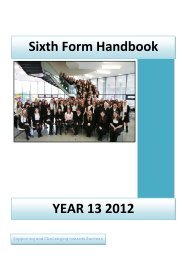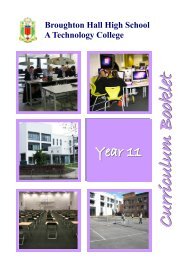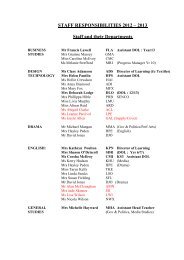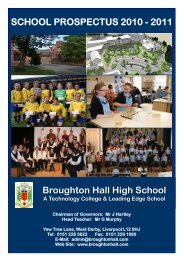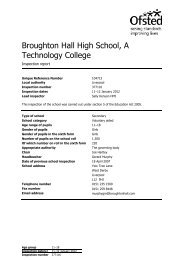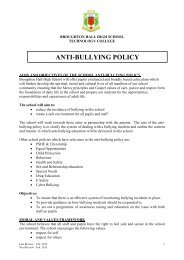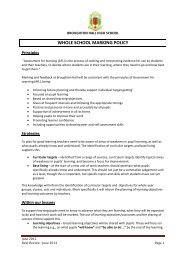Sixth Form Prospectus 2013 - Broughton Hall High School
Sixth Form Prospectus 2013 - Broughton Hall High School
Sixth Form Prospectus 2013 - Broughton Hall High School
- No tags were found...
You also want an ePaper? Increase the reach of your titles
YUMPU automatically turns print PDFs into web optimized ePapers that Google loves.
Applied Health and Social Care AS and A2Students will follow the New AQA AS/A2 in Applied Health & Social Care from September2012. This specification is designed to suit students hoping to pursue a range of careersincluding, Childcare, Nursing, Paediatrics, Midwifery, Social Work, Police Officer,Probation officer/YOT, Medicine, Paramedic, Health Visitor, Mental health andCounselling.AS Level - For the AS Level (Single Award) you will cover two units:HSCO1: Effective Care and Communication (Portfolio- Coursework unit)This unit looks at the importance ofdeveloping good Communication Skillsto provide high quality care in a range ofsettings. You will look at a range ofCommunication and Caring skills and willexamine how these are applied to specificclient groups in an actual Care setting. Youwill also look at how barriers can preventpeople from being cared for effectively. Youwill also research how clients can be treatedbadly in care settings.HSCO2: Understanding Health Conditions and Patient Care pathways. (Examination)This unit looks at expanding your knowledge of a range of different health conditions, theirsymptoms and how they are treated. The unit also examines the impact of these illnesseson a patients Physical, Intellectual, Emotional and Social development. You will look atwhat is meant by Patient Centred Care and the types of Care pathways that patients willfollow during their treatment.A2 Level - For the second year of the A level you will cover a further two units:HSCO6: Practitioner RolesThis is a compulsory (Synoptic unit) which is assessed by Coursework. This unit willincrease your understanding of the world of work in health, social care, children and youngpeople and Community justice sectors. You will look at arrange of roles and assess yoursuitability for them as possible future career choices.There will be one additional examined Unit to undertake: This will be either Unit 5,7or 10.The choice will be from: HSCO5 – Learning & Development, HSCO7 – Food & Fitness andHSC10 – Diagnosis and Preventative Strategies.For more information about this course contact Miss Tickle.5
Applied Science AS and A2Students will follow the AQA specification which features:• Testing, analysing and carrying out experimental work• Considering the economic, social and environmental impact of science• Preparing for a career in applied scienceContentSingle Award AS:Comprises three units. All are compulsory. One is anexam and is externally assessed and two are internallyassessed pieces of coursework.Single Award A2:Comprises a further three units in addition to AS. Oneunit is compulsory and is internally assessed. Of thetwo optional units one must be externally assessed. A2cannot be studied without AS. A2 is available in Y13.Entry RequirementsThe course is open to all students who haveachieved GCSE grade C in Core and AdditionalScience or GCSE Applied Science and Grade C inEnglish and Maths and 2 other subjects. The mostimportant thing you need in order to take GCEApplied Science is a willingness to explore new ideasand an ability to communicate your ideas effectively.Students should be aware that the course of study will require visits to experienceapplication of science in the workplace. Some of these will be organised through schooland some may require personal organisation.ProspectsStudents with Applied Science have access to a wide range of career and higher educationopportunities. You will learn and use a variety of transferable skills throughout the course.These skills are in great demand and are recognised by employers, universities andcolleges as being of great value.For more information about this course contact Miss Tickle or Mr Brierley.6
Biology AS and A2The Biology Department is large and successful with over 30 students currently studyingA Level. Many A Level students went on to study Biology in some way at higher educationlast year.ContentYear 12AS Unit 1 Biology and DiseaseAS Unit 2 The Variety of Living OrganismsAS Unit 3 Practical and Investigative Skills taught within Units 1 and 2Year 13A2 Unit 4 Populations and EnvironmentA2 Unit 5 Control in Cells and OrganismsA2 Unit 6 Practical and Investigative Skills taught within units 4 and 5Entry RequirementsTo enter the AS A Level Biology course, you will need to have achieved Grade B in Coreand Additional Science and Grade B in Maths.Biology may be combined with a variety of subjects at A Level, but you need to be awarethat many Biological degrees also require A Level Chemistry, especially veterinary andmedical courses.ProspectsPossible career choices could include:Medicine, dentistry, nursing and associated careers, e.g., physiotherapy, radiography,veterinary work, the pharmaceutical industry, research work in the biological sciences,teaching, scientific civil service, forestry, etc..For more information about this course contact Mrs Williams.8
Business Studies AS and A2This course will develop many of the key topics studied at GCSE level. However, thisdoes not mean that if you have not studied Business Studies at that level you should notconsider this course. To do well on this course, students need to have an interest in the worldaround them and want to study a subject that is relevant to their own lives and experiences.This course will provide a good preparation for those wishing to go to university, as it willencourage candidates to acquire a range of important and transferable skills that include:• Data skills – candidates will need to manipulate data in a variety of forms andinterpret their results.• Making justifications on the basis of available evidence.• Research skills – candidates will need to research a topic in preparation for Unit 4 ofthe course.ContentYear 12AS Unit 1AS Unit 2Year 13A2 Unit 3A2 Unit 4Planning and Financing a Business (20% of A Level marks)Managing a Business (30% of A Level marks)Strategies for Success (25% of A Level marks)The Business Environment and ManagingChange (25% of A Level marks)Entry RequirementsStudents should normally have gained A or B grades in at least 5 different subjects.Although Business Studies is preferable, it is not essential.ProspectsStudents taking this course have access to a wide range of higher education opportunities.Many students go on to follow degree courses in Retail Management, Marketing, HumanResources, Accounts and Economics. This subject will help you to understand the world ofbusiness and will help prepare you for a career in the business world.For more information about this course contact Mr Lawell.9
Business Studies - BTEC Level 3Students taking this course do not need to have studied Business Studies at GCSE level andit can be taken as either a one or two-year qualification• One year course: BTEC Level 3 Certificate (equivalent to an AS Level qualification)• Two year course: BTEC Level 3 Subsidiary Diploma (equivalent to an A2 levelqualification)This is a vocational course and students will learn about the world of business and therange of internal and external factors that ensure success. Students will develop theirknowledge and understanding of the subject by examining real-life businesses andproducing portfolio work that will help students to develop skills in a number of areas.Assessment is through l00% coursework, there are no examinations. This is a practical,work related course and students will learn by completing projects and assignments thatare based on realistic situations.Entry RequirementsStudents should have a minimum of 5 GCSEs (grade C or above) in five different subjectsand do not have to have studies Business Studies at GCSE level.ProspectsBTECs are widely recognised by Universities, with the qualification relating to the UCASpoints. Popular career choices include business management and marketing. It providesyou with the opportunity to develop a range of skills and techniques, personal skills andattributes essential for successful performance in working life.For more information about this course contact Mr Lawell.10
Chemistry AS and A2Students will follow the AQA specification which will encourage candidates to:• develop essential knowledge and understanding of the concepts of Chemistry andthe skills needed for the use of these in new and changing situations;• develop an understanding of the link between theory and experiment and howscience works;ContentYear 12AS Unit 1 Foundation ChemistryAS Unit 2 Chemistry in ActionAS Unit 3 Investigate and Practical Skills in AS ChemistryYear 13A2 Unit 4 Kinetics, Equilibria and Organic ChemistryA2 Unit 5 Energetics, Redox and Inorganic ChemistryA2 Unit 6 Investigate and Practical Skills in A2 ChemistryEntry RequirementsThis course is open to all students who have achieved grade B at Core and AdditionalScience. GCSE grade B in Mathematics is also essential.ProspectsYou may wish to go into a career in the field of Chemistry itself or you may go in adirection where Chemistry acts as a useful or even essential backup. Your future careermay lie in a direction where Chemistry is not relevant, but having successfully studiedChemistry it shows your intelligence, application and ability to learn. Chemistry is an essentialA level for courses in medicine, dentistry, veterinary science, pharmacy and microbiology.For more information about this course contact Miss Skiming or Mrs Croft.11
Design Technology: Product Design – 3D Design AS and A2Students will follow the AQA specification which consists of Learning through designing,making and exploring how products are made and how they work. Creating innovativeproducts which satisfy a specific need.ContentYear 12AS Unit 1AS Unit 2Year 13A2 Unit 3A2 Unit 4Materials, Components and Applications 50% - Written 2 Hour exam.Learning through designing and making 50% - Centre assessed DesignPortfolio.Design and Manufacture 50% - Written 2 hour exam.Design and Manufacture 50% - Centre assessed Design Portfolio.Is this Course for me?If you enjoy designing and making products, analysing existing products to see howthey work and how they could be improved, being creative and innovative, learningindependently then this is the course for you.What could this course lead on to?If you study Product Design you are opening the door to a wide range of exciting careerpaths including:ArchitectureGraphic DesignerInterior designingDesign Technology TeacherMarketingProduct designerEngineerStructural surveyingEntry RequirementsThe course is open to students who have achieved Grade C or above in a Design andTechnology Subject. You should have an interest in Design and a desire to create newinnovative products. ICT plays an important part of the course and the use of modern CAD/CAM facilities such as laser cutters and CNC machines will be encouraged.For more information about this course contact Mrs Crewdson.12
Design Technology: Product Design - Textiles AS and A2If you• Have enjoyed the challenge of GCSE Design and Technology - Textiles• Did not study Textiles, but wish you had• Like designing and making things• Enjoy working with graphics, colour and fabrics• Have been impressed with the fashion work in the Textiles roomsThen this could be the course for you.ContentYear 12Unit 1Unit 2Materials, Components and ApplicationLearning through Designing and makingYear 13Unit 3Unit 4Design and ManufactureDesigning and making practiceEntry RequirementsThe course is open to students who have achieved a grade B or above in any of theDesign and Technology disciplines. Throughout the course, an appreciation andunderstanding of the Textiles industry is nurtured and developed through theappropriate liaisons with professional designers, technologists, industry andcommerce. Students are actively encouraged to experience a wide range ofareas in the industry with visits to designer fashion houses in London, to industrialmanufacturing companies, the Clothes’ Show Exhibition and open days at local universities.ProspectsThe textiles industry is one of the biggest manufacturing industrieswithin the UK. A career within textiles has opportunities in a wide range ofexciting commercial areas in the world-wide fashion industry, retailing andengineering. Studying Product Design: Textiles will develop a student’s ability to designand analyse the multiple and varied applications for textiles in the world around us.For more information about this course contact Mrs Adamson.13
English Literature AS and A2Students will follow the new AQA specification:• This specification has a clear philosophy of reading and meaning and aims toencourage pupils to develop as an informed, independent reader and critic ofliterary texts. This will be achieved through a course of wide and close reading.• This course provides pupils with maximum opportunities for both coursework andopen text examination papers. Such opportunities require research on the one handand close focus on specific parts of the text on the other.• There is a structured progression from GCSE to AS and A2.ContentYear 12AS Module 1AS Module 2Year 13A2 Module 3A2 Module 4Texts in ContextCreative Study - CourseworkDrama and ProseReading for Meaning:Love through the agesExtended essay and Shakespeare Study - CourseworkEntry RequirementsThis course requires a love of reading and a readiness to investigate, not only theset texts, but a wide range of supporting material. In addition, you will need todemonstrate initiative in personal research and organisational skills and toappreciate that success depends on the enthusiasm with which you consolidate lessons withpersonal investigation. Willingness and confidence in forming your own opinion and toexpress it with conviction are also necessary requirements. This course is open to studentswho have achieved grade A*- B in both English Language and English Literature GCSE.ProspectsThis is a highly regarded qualification, which will be acceptable for any course of study atdegree level. It is particularly suitable for students who wish to progress to journalism,teaching, publishing, the media or any career which requires a high level of literacy. It isan excellent preparation for the demands and study skills needed for higher education.For more information about this course contact Mrs Poulton.14
French AS and A2Students will follow the AQA specification.Entry RequirementsThe course is open to students who have achieved a GCSE grade B or above in Frenchalthough a higher grade is recommended. The course aims to develop the ability tounderstand and use French to a high level. By building on what you have done at GCSEmost of the work will be done in French and taught through a range of topics usingbooks, newspapers, magazines, video, listening material and ICT. All students are stronglyrecommended to visit France during their AS/A Level course to practise and extend theirlanguage. A number of students have benefited from a work placement in France or Spain.Students will also have the opportunity to attend lectures and performances and opendays at local universities when available.What can I do with Languages?Besides teaching?! The range of university and job opportunities is endless. People whocan offer expertise in Science, ICT and Business Studies along with competence in oneor more foreign languages are very much in demand these days. The study of foreignlanguages will make you more marketable to potential employers, especially if you havethe experience of living and working abroad. The unemployment rate is lower amongstmodern language graduates than for most other groups.ProspectsThere are many university degree courses which include a foreign language. Some ofthese courses may seem unusual, but many employers are looking for personnel with thenecessary skills to seize business opportunities abroad. Studying Modern Languages willcertainly improve your higher education and employment prospects.Doing an A or AS Level in a foreign language also helps to prepare you for taking up newand more unusual languages at university.For more information about this course contact Mrs Davies.15
Government & Politics AS and A2Students will follow the AQA specification, which:• develops candidates’ critical thinking skills;• encourages analysis of the changing dynamics of modern politics;• inspires the ability to interpret, evaluate and comment;• introduces relevant new options to update this contemporary subject.ContentYear 12Unit 1Unit 2People, Politics and ParticipationGoverning Modern BritainYear 13Unit 3Unit 4The Politics of the USAThe Government of the USAEntry RequirementsIt is not necessary to have studied Politics at GCSE to undertake this A Level course. Whatis necessary is a lively, enquiring mind and willingness to work hard. It would suit studentswho enjoy reading, note making and essay writing, but it also involves plenty of livelydiscussion and debate. Students are encouraged to use a wide range of media to enhancetheir political knowledge and awareness. Above all, it is an ‘alive’, interesting subject whichdeals with topics and issues that receive daily coverage in all sections of the media. Visitsto A Level lectures in Manchester and London are arranged whenever appropriate and, atsome stage in the course, a residential visit to London takes place.ProspectsThe skills which are developed are useful in law, management, banking, social work, civilservice, local government, teaching, journalism and television.For more information about this course contact Mrs Hayward.16
History AS and A2Students will study 4 Units of Work. Two at AS Level and Two at A2Unit Content AS/A2Unit One will cover Russia from the mid Nineteenth Century to the Russian Revolution.Unit Two will cover Germany from the late nineteenth century to 1945 and will focus onHitler, the German People and the Holocaust.Unit Three will cover aspects of British History in the Twentieth CenturyUnit Four is the Coursework Unit.It is anticipated that an integral part of the course will be site visits to relevant areas.Entry RequirementsThis course is open to students who have achieved grade A* - B in English and A* - B inHistory, if History has been taken at GCSE. It is not, however, necessary to have takenGCSE History to study A Level History.The History Department has an excellent library of resources, including books, journals,audio and video tapes. Educational visits to academic lectures and historical sites andfilms will be arranged wherever possible.ProspectsHistory is a valuable qualification for careers in law, politics, journalism, media,management, administration, tourism and recreation and is held in high esteem byuniversities and employers alike.For more information about this course contact Mrs Fielding.17
Hospitality - BTEC Level 3 CertificateOver the past few years, employment in the hospitality industry has increased. Butthere remain significant gaps, particularly in the following areas: customer service;interpersonal skills; supervisory skills; finance; and employability skills. This BTEC Nationalseeks to address these areas by encouraging the acquistion and development of thesecompetencies.The certificate is particularly suitable for students wanting to take a vocationalequivalent of one A level alongside traditional academic subjects. This course will lead toa wide variety of study routes and career options. Opportunities exist to manage hotels,run restaurants or specialise in accountancy or information technology within the sector.This is a sound background for those students who wish to complete a more practicalcatering course or study Dietics, Nursing, Chidcare, Environmental Health, marketing,Sport Studies.Entry RequirementsStudents may progress to the BTEC <strong>High</strong>er National qualifications (HNCs and HNDs)or it provides a springboard to a University Foundation Degrees in an appropriatevocational discipline. The BTEC National Award in Hospitality also equips learners withskills and knowledge that will aid their career progression in the hospitality industry,making them ideally placed to enter management training.For more information about this course contact Mrs Pantlin or Mrs Fox.18
ICT Level 3 - OCR NationalsThe focus of the course will be on communication skills, case analysis, problem solvingand collaborative working.Compulsory UnitsUnit 1: Digital Business CommunicationUnit 2: Collaborative WorkingUnit 3: Problem SolvingUnit 4: Creating a Digital ShowcaseOptional UnitsTwo units will be studied from a range of specialist unit.Entry RequirementsThe qualification does not have an AS structure. There is no stepping stone to the full OCRNational in ICT Level 3. There is no examination. The course is 100% coursework. Teacherassessment will be verified by an external moderator visit, or series of visits. Units can beexternally verified at any time during the course.ProspectsThe OCR National in ICT Level 3 qualifies for UCAS points, so if you complete itsuccessfully you could move on to study for a degree or BTEC <strong>High</strong>er National Diploma inrelated subjects such as ICT, Computer Science, Information Systems, Multimedia,Software Engineering, Computer Networking, e-Business and InformationManagement. You could also go on to work-based training such as IT User/PractitionerNVQ or vendor-specific qualifications.For more information about this course contact Mr Wilkinson.19
Mathematics AS and A2Students will follow the EDEXCEL specification which features:• clearly defined topic content;• a choice of 6 modules from 18;• examinations taken at regular intervals throughout the course.ContentYear 12AS Module C1 Core Mathematics 1AS Module C2 Core Mathematics 2AS Module S1 Statistics 1Year 13A2 Module C3 Core Mathematics 3A2 Module C4 Core Mathematics 4A2 Module D1 Decision Mathematics 1Entry RequirementsYou do not have to be a genius to be successful in A Level Mathematics, although it helps!You will preferably need a grade A or B in GCSE. You will also need the determination towork at a problem until it is solved, and not until the phone rings or there is somethinggood on TV!ProspectsA level Mathematics is highly respected by both employers and further educationestablishments. From Accountancy to Zoology, the ability to use mathematics is a valuedskill. Mathematics is fundamental in the understanding of the complex society we live inand most important of all is the most powerful means of communication throughout theworld. It is hoped that those studying maths do not do so purely for future employmentprospects. Like most worthwhile quests in life, the study of Mathematics brings its ownrewards.For more information about this course contact Mr Tollitt, Miss Van Saarloos, MissMunro, Miss Taylor or Miss Stone.20
Media Studies AS and A2Students will follow the AQA specification, which features:• comprehensive and integrated coverage of media theory and practice with specialemphasis on emerging technologies;• audiences as both producers and consumers of media texts;• opportunities for candidates to investigate personal media interests and including achoice of cross-media studies;• a rolling programme of production briefs and pre-set topics.ContentYear 12Unit 1Unit 2Investigating MediaCreating Media (Practical Production)Year 13Unit 3Unit 4Media: Critical PerspectivesMedia research and Production (Practical Production)Entry RequirementsThis course is open to students who have achieved a Grade C orabove in English and who have an interest in understanding howthe media works. You will be required to carry out independentresearch and study and produce work of a practical nature. Theability to think, analyse and evaluate is essential. Visits to A Levellectures in Manchester and London and to the cinema and othermedia outlets are arranged whenever appropriate and, at somestage in the course, a residential visit to London takes place.ProspectsThe media is the most important means by which information,ideas, aesthetic experiences and entertainment is transmitted.To develop an understanding of how it works will be valuable inwhatever you go on to do. More specifically this course is a basisfor most degree courses in media and other related subjects. It isparticularly suitable for students who wish to pursue a career inmedia or any area where critical thinking is required.For more information about this course contact Mrs Hayward or Mrs Hudson.21
Performing Arts - Dance/Drama/MusicEntry Requirements• GCSE Dance/Drama/Music/Expressive Arts (or level 2 equivalent): Grade A*-C inat least one of these subjects• GCSE English Language: Grade A*-C• Prior performance experience/graded examinations in Dance/Drama/Music ifGCSE has not been studiedOther Entry Requirements• A willingness to perform in the chosen specialism (Dance/Drama/Music)• Excellent organisation skills and a strong work ethic• An ability to structure and present information, ideas, descriptions andarguments clearly and logically• A commitment to spending own time to study/research/rehearse.• Music students should study an instrument/voice (Grade 4+) and be willing tohave individual tuition for their skill development.• All students are expected to attend extra-curricular activities relating to theirchosen specialism and attend live performances when applicable.This A level qualifies for UCAS points and prepares students for a variety of highereducation & career routes, both within and outside of the Performing Arts.ProspectsStudents will not only improve their practical skills in one of the artsdisciplines offered (Dance, Drama or Music) but also demonstrate their all-roundemployability through developing skills relevant to a wide range of professions.Producing written portfolios & evaluative documents, devising andmanaging events, improving self-presentation, time management, communication andorganisational skills are just some of the work-related learning the students will cover.For students interested in a career or further study in the Performing Arts sector, they willhave the opportunity to develop their performance skills to a high standard while learningmore about professional working practices relevant to this industry.For more information about this course contact Mrs Ellams or Mrs Bromilow (Dance), MrMangan (Drama) or Miss Hayes (Music).22
Personal Effectiveness - Certificate (CoPE) Level 3CoPE provides a framework for the development, assessment and accreditation of genericand wider key skills and wider activities, through a nationally recognised qualification atLevel 3. The qualification offers imaginative ways of accrediting young people’s activities.They promote, and allow centres to record, a wide range of personal qualities, abilitiesand achievements of young people, as well as introducing them to new activities andchallenges.ContentStudents choose challenges from the following six modules. Students gain credits forchallenges completed, with two credits awarded for 20 hours of activity, three credits for30 hours and five credits for 50 hours. Students must gain a minimum of 15 credits tocomplete the full qualification, choosing challenges from at least three modules.Students produce a portfolio of evidence, which should demonstrate competence inthe Wider Key Skills (Working with Others, Improving Own Learning and Performanceand Problem Solving) at Level 3 and the units Planning and Carrying Out Research,Communicating through Discussion and Planning and Giving an Oral Presentation atLevel 3.AssessmentAfter students’ portfolios have been internally moderated, centres must registercandidates names for external moderation at least six weeks in advance of a regionalmoderation meeting. ASDAN will issue certificates following successful moderation.Status and ProgressionThe qualification does not have an AS structure. There is no stepping stone to the full OCRNational in ICT Level 3. There is no examination. The course is 100% coursework. Teacherassessment will be verified by an external moderator visit, or series of visits. Units can beexternally verified at any time during the course.ProspectsThe Certificate of Personal Effectiveness qualifications at Levels 1, 2 and 3 have had theirapproval period renewed and extended to August 2010, with certificates awarded untilAugust 2012. CoPE at Level 3 has recognition from UCAS and is worth 70 UCAS points(roughly equivalent to an A grade at AS Level).For more information about this course contact Sue Reid.23
Physics AS and A2Students will follow the new AQA specification.ContentYear 12PHY A1 Unit 1PHY A2 Unit 2PHY A3 Unit 3Year 13PHY A4 Unit 4PHY A5 Unit 5PHY A6 Unit 6Particles, Quantum Phenomena & ElectricityMechanics, Materials & WavesInvestigative and Practical skills in AS PhysicsFields and Further MechanicsThermal and Medical PhysicsInvestigative and Practical Skills in A2 PhysicsEntry RequirementsThe course is open to students who have achieved two grade Bs or above in core andAdditional Science and grade B in GCSE Maths.ProspectsThe aim of Physics is very grand, that is to explain almost every aspect of our world anduniverse. An A/AS Level Physics course cannot hope to explain everything or even coverevery part of physics. What it will do is bring you face to face with the fundamental ideas,concepts and knowledge that make up protons, neutrons and the very largest stars,galaxies, even the universe itself.Employers rate Physics qualifications very highly, because of the high problem-solvingabilities that it engenders, and so by studying Physics you will open doors to a wide varietyof jobs and careers. Examples of careers routes for students studying Physics are mostforms of engineering, high technology industry, computing and information technology,law, medicine, management, accountancy and many forms of environmental and scientificresearch.For more information about this course contact Mr Brierley.24
Psychology AS and A2Psychology is now an established subject in the AS/A2 curriculum and is one of the mostpopular. It is an exciting subject which covers a range of diverse topics. Psychology isdefined as “The Science of Mind and Behaviour”.We use the AQA Syllabus (A) which is a four Module Examination across the two years.There will be 2 modules in Year 12 and an additional 2 to undertake if you wish to take thesubject to A2 Level.Unit 1Unit 2Unit 3Unit 4Cognitive Psychology, Developmental Psychology and Research MethodsBiological Psychology, Social Psychology and Individual DifferencesTopics in PsychologyPsychopathology, Psychology in Action and Research MethodsEntry Requirements:To undertake the AS/A2 Psychology you do not have to have undertaken Psychology atGCSE. However, Psychology does have a strong scientific basis and it is recommended thatyou will need to have achieved at least 6 GCSE’s in separate subjects at grades A-C witha minimum Grade B/B in Double Award Science and at least a Grade B in Maths and inEnglish. Interest in People and their behaviour is essential!Prospects:Psychology is a diverse subject and the knowledge and skills you will learn on the courseare increasingly used in many professions and careers. Psychology itself contains manyspecialities such as Sports Psychology, Forensic and Criminal Psychology. If you want acareer such as becoming a Clinical Psychologist or in any of the specialist areas you willneed to undertake a first degree (usually a single honours degree). However, careers suchas nursing, teaching, police work, human resources, etc, all view Psychology A Level veryfavourably.For more information about this course contact Miss Tickle or Mrs Graham.25
Religious Studies AS and A2Students will follow the new AQA specification which will encourage candidates to:• develop an interest and enthusiasm for a rigorous study of religion;• treat the subject as an academic discipline by developing knowledge andunderstanding appropriate to a specialist study of religion;• use an enquiring, critical and emphatic approach to the study of religion.ContentYear 12AS Religious Ethics.AS Developments in Christian Theology .Year 13A2 Religious Ethics 2A2 Developments in Christian Theology 2Entry RequirementsThe course will be open to candidates who have achieved a GCSE grade C or above inReligious Studies. Students should be committed to work hard and be open to learningnew skills in reasoning, debating and in analysing.ProspectsAll universities accept and welcome students with Religious Studies onto a variety ofcourses in Humanities, Arts and the Sciences, as well as specific courses in ReligiousStudies and Related Disciplines. Employers value the skills in students that ReligiousStudies develop, such as the ability to form balanced arguments, analyse critically andbe able to appreciate different viewpoints. Religious Studies opens up opportunities foremployment in many areas of work, such as teaching, journalism, medicine, management,police, childcare and many others.For more information about this course contact Ms Canny, Mrs Spike or Mrs Penny.26
Spanish AS and A2Students will follow the AQA specification.Entry RequirementsThe course is open to students who have achieved a GCSE grade B or above in Spanish. Thecourse aims to develop the ability to understand and use Spanish to a high level. By buildingon what you have done at GCSE most of the work will be done in Spanish and taught througha range of topics using books, newspapers, magazines, video, listening material and ICT.All students are strongly recommended to visit Spain during their AS/ALevel course to practise and extend their language. A number of students havebenefited from a work placement in Spain. Students will also have the opportunity toattend lectures and performances and open days at local universities when available.ProspectsThere are many university degree courses which include a foreign language. Some ofthese courses may seem unusual, but many employers are looking for personnel with thenecessary skills to seize business opportunities abroad. Studying Modern Languages willcertainly improve your higher education and employment prospects. Doing an A or ASLevel in a foreign language also helps to prepare you for taking up new and more unusuallanguages at university.What can I do with Languages?Besides teaching? The range of university and job opportunities is endless. People whocan offer expertise in Science, ICT and Business Studies along with competence in oneor more foreign languages are very much in demand these days. The study of foreignlanguages will make you more marketable to potential employers, especially if you havethe experience of living and working abroad. The unemployment rate is lower amongstmodern language graduates than for most other groups.Will a Language fit in with my other subjects?Do not worry too much about combinations of subjects unless you have a very specificcareer or university course in mind. A and AS languages combine well with any subjects andwill allow access to any university courses including Law and Medicine. You could also talkto your language teachers who will let you know if you are really suitable for the course.For more information about this course contact Mrs Davies.27
Entry to the <strong>Sixth</strong> <strong>Form</strong> - Process of advice and informationIn order to help students make appropriate choices for continuing into <strong>Sixth</strong> <strong>Form</strong>, thefollowing process will be followed.December - JanuaryQuestionnaire to find out pupils’ intentions following GCSEexams.Mrs Lodge meets with groups of Year 11 pupils to providefurther information about <strong>Sixth</strong> <strong>Form</strong> and to answer questions.JanuaryThursday 24th January <strong>2013</strong> - Year 11 Parents’ EveningMrs Lodge will be available to answer questionsDirectors of Subjects and subject staff inform pupils about the<strong>Sixth</strong> <strong>Form</strong> courses.Thursday 31st January <strong>2013</strong><strong>Sixth</strong> <strong>Form</strong> Information Evening - 7.00pm<strong>Prospectus</strong> available.Drop - in: Mrs Lodge’s Office for all Year 11 pupils & parentsMrs Lodge will be available to answer questions each Wednesday- Friday between 3.10 - 4.00 pm.February - AprilPupil and parent Curriculum Review Meetings with a memberof the <strong>Sixth</strong> <strong>Form</strong> Pastoral Team and Senior Leadership Team,following which an offer of a place may be made.June - JulyAugustSeptemberPupils attend subject taster sessions for <strong>Sixth</strong> <strong>Form</strong> courses.Failure to attend Taster Sessions may result in a student not beingable to register on the course if the course is oversubscribedThursday 22nd August <strong>2013</strong> - GCSE Results Day<strong>Sixth</strong> <strong>Form</strong> Registration - Confirmation of coursesEntrance to <strong>Sixth</strong> <strong>Form</strong> is dependent upon an appropriate prior record of attendance andcommitment to work. You should talk to your subject teachers, seek advice about courserequirements and make sure you understand what will be expected of you.29
<strong>Sixth</strong> <strong>Form</strong> RequirementsLife in the <strong>Sixth</strong> <strong>Form</strong> at <strong>Broughton</strong> <strong>Hall</strong> is challenging and rewarding. In order to derivemaximum benefits from the many varied opportunities, we would ask you to complywith the following basic requirements:• Students must attend morning registration and all lessons.• Any absence must be authorised by a signed letter from parents/guardians.No student may have unauthorised absences from school.• Year 12 will be required to attend school from 8.40 am - 3.00 pm.They will be expected to use free lessons for private study in school.There will also be an opportunity to study outside of normal school hours.• Only <strong>Sixth</strong> <strong>Form</strong> students are permitted to leave school premises at lunchtimes.• As from September 2012 all students will be required to wear the following<strong>Sixth</strong> <strong>Form</strong> uniform from Laser <strong>School</strong>wear:A plain white blouse (from £10.99 for a pack of 2)Plain black skirt with inverted pleat (from £14.99) ORBox Pleat Skirt (from £14.99)Plain black jumper (from £13.75) ORPlain black cardigan (from £14.25)Plain black shoes - No flip flops, sandals, trainers or boots.Coats or jackets should be plain black, No denim or leather of any colour.For students who study Sport at Collaborative <strong>School</strong>s, the <strong>Broughton</strong> <strong>Hall</strong> <strong>School</strong>Tracksuit should be worn.Each student will be expected to be conscious of her/his responsibilities to the wholeschool community, paying special attention to the impact of the <strong>Sixth</strong> <strong>Form</strong>er on youngerpupils.• Students will be expected to give full commitment to their studies. <strong>Sixth</strong> <strong>Form</strong> studyis full-time.• Part-time work: Students should be aware of the impact of part-time work on theirstudies and we recommend that students keep this to a maximum of 10 hours perweek.30
Curriculum <strong>2013</strong>/14The post-16 curriculum: Level 3AS/A2• Applied AS/A2 courses have increased units assessed through coursework and fewerunits assessed by examination.• Students will be awarded AS certification at the end of year 12 and at the end of Year13, A Level certification. Complete AS + A2 = A Level.B TEC and Certificate of Personal EffectivenessB Tec courses, which are particularly suited to students who prefer to be assessed unit byunit on coursework.Most students choose four subjects in Year 12 and three subjects in Year 13.A minimum of 3 AS/A2 subjects must be studied throughout Year 12 and Year 13Entry RequirementsTwo year courseLevel 3 CoursesStudents wishing to follow a predominantly A Level route taking 3 or 4 Level 3 Coursesin Year 12 and 3 Level 3 Courses in Year 13 will require GCSE grades A*-C in at least 5different subjects.A number of AS/A2 courses require A* - B in the subject to be studied and may alsorequire the addition of GCSE Maths, English or Science at grade C or above. Please checkentry requirements for each subject. In <strong>Sixth</strong> <strong>Form</strong> we recognise the importance forstudents to develop independent learning and to experience a range of teaching andlearning styles. Teaching of some courses in years 12 and 13 are shared with othercollaborative schools31
Information, Advice & GuidanceThis is a most important aspect of life in the <strong>Sixth</strong> <strong>Form</strong>.The school network provides access to software including KUDOS, KEY CLIPS andPATHFINDER + HE. Students have direct access to the UCAS website and applicationsare made online in Year 13.Other useful websites include:• www.ukcoursefinder.com• www.ucas.com• www.connexionslive.comYou will also have access to the latest information on careers and information on over40 higher education subjects through the Connected Portal which is provided throughGreater Merseyside Connexions Partnership. You will need to register for the site throughthe Connexions live website. For more information speak to your Year Head or <strong>Form</strong> Tutor.Careers interviews can be arranged for any student in need of advice with our ConnexionsAdviser. Guidance is provided for those students wishing to apply for apprenticeship orgoing into employment at 18+ and includes interview skills and writing CV’s.Support is given in the UCAS application through a planned programme. Visits areorganised to Universities including Oxbridge and students are encouraged to undertakeresidential experiences and to attend open days. Students are encouraged toorganise relevant work experience during Enrichment.Other useful websites include:• www.ucas.com• www.opendays.com• www.tiger-nw.org.ukMonitoringAll students will be monitored through the Support and Challenge MentoringProgramme which provides students with information about their progress on sixoccasions throughout the year. Progress Tutors/Mentors will meet with students todiscuss grades and set targets to ensure progress. Parents will be regularly informed ofprogress by means of Support and Challenge Data, Support and Challenge Review Dayand Parents’ Evening. Every effort will be made to provide the best opportunitiesand students are expected to play their full part in order to achieve their potential.32
BSF - Our New <strong>School</strong>“Our vision for the future is to provide a 21st Century learning environment thatensures that each individual fulfils their potential by providing learning opportunitiesthat are continuous, relevant and adaptable. We are using the latest technologies toprovide challenge, pace and rigour for pupils and staff but building on the values of theSisters of Mercy reflecting fairness, respect and care.Our building is innovative and challenges conventions but is designed to be flexible tomeet the likely demands of the Future. Our lead architect Scott Prisco is the awardwinning designer of the Microsoft <strong>High</strong> <strong>School</strong> of the Future in Philadelphia, whichstaff and students have visited. We have designed our curriculum to provide connectedlearning for our young people developing the skills required for the demands of ourrapidly changing world.” Mr G Murphy, <strong>Broughton</strong> <strong>Hall</strong> Educational Consultant33
Contact Information<strong>Broughton</strong> <strong>Hall</strong> <strong>High</strong> <strong>School</strong>Technology College & Leading Edge <strong>School</strong>Yew Tree LaneWest DerbyLiverpoolL12 9HJTelephone: 0151 235 1500<strong>Sixth</strong> <strong>Form</strong>: 0151 235 1552Fax: 0151 259 8448E-mail: admin@broughtonhall.comInternet: http://www.broughtonhall.comHead Teacher:Deputies:Assistant Head Teacher:Director of Years 12 &13:Progress Manager - Year 13:Progress Manager - Year 12:Student Support Manager:E-Mail:Ms S ClarkeMrs M GrantMr G PrestonMrs M HaywardMrs D LodgeMs K ParkMr F LawellMrs K Barneslodged@broughtonhall.comlawellf@broughtonhall.comparkk@broughtonhall.combarnesk@broughtonhall.com34
<strong>Broughton</strong> <strong>Hall</strong> <strong>High</strong> <strong>School</strong>Designed and created by James Regan and Kerry BarnesPrinted by Oriel Studios



